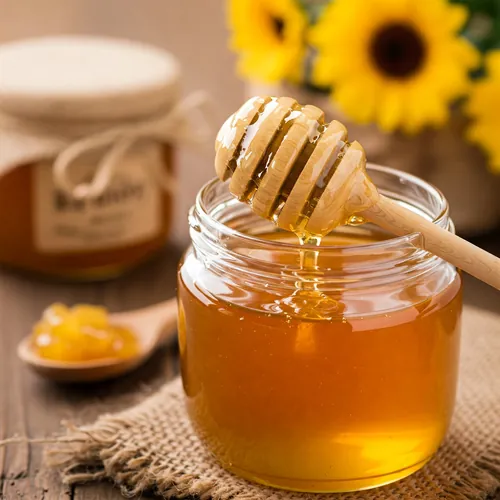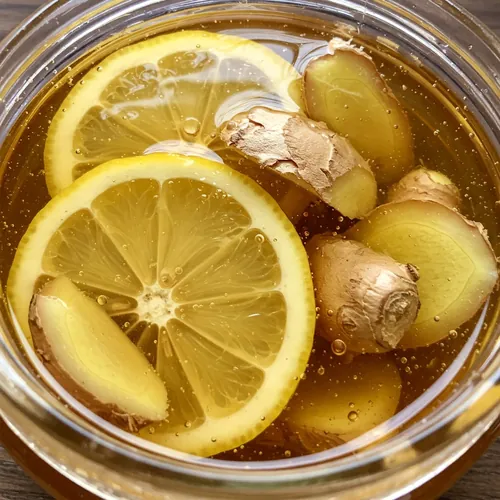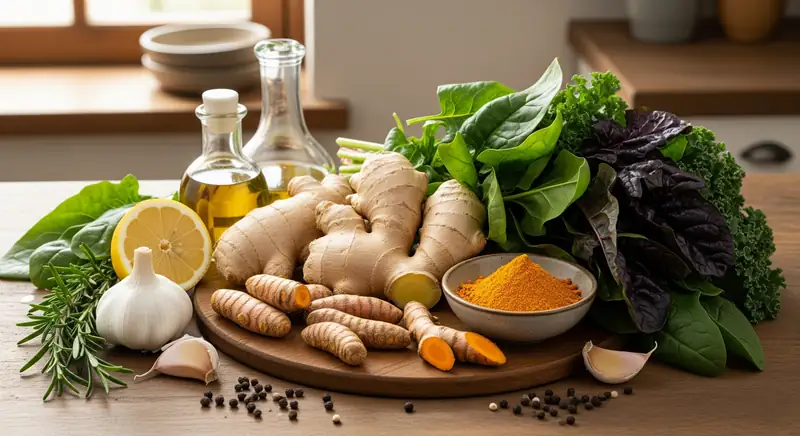How to Make Honey Lemon Cough Syrup at Home

It’s truly no fun when a cough or a sore throat makes you feel crummy, isn’t it? That scratchy feeling, the constant urge to cough. It can really get in the way of feeling your best. When you’re feeling under the weather like that, finding something gentle and effective to help soothe things is usually at the top of your mind.
Maybe you’ve heard about using simple things from your kitchen, like honey and lemons, to help with coughs and sore throats? It turns out that these natural helpers have been used for a long time, and there’s even some research that looks into why they might work.
Sometimes, you just want a comforting, natural way to help ease those annoying symptoms. That’s where learning how to make honey lemon cough syrup at home comes in handy! It’s a popular natural remedy, and for good reason.
Let’s dive into how you can whip up a soothing honey and lemon mixture, possibly with a little help from ginger too, right in your own kitchen. We’ll explore what makes these ingredients helpful and share a simple way to prepare your own batch.
Understanding the Natural Helpers: Honey, Lemon, and Ginger
Before we talk about making a mixture, let’s look at the key players: honey, lemon, and ginger. Why are they often recommended for coughs and sore throats?
The Sweet Relief of Honey

Honey is a truly amazing natural substance made by bees from flower nectar. It’s known for its sweet taste, which comes mainly from natural sugars like fructose and glucose. But it’s not just sweet; honey has been used for a very long time as a remedy for sore throats. In fact, major health organizations like the Centers for Disease Control and Prevention (CDC) and the World Health Organization (WHO) have suggested using honey for sore throats for adults and children who are at least 1 year old.
So, how might honey help? One way is simply by coating your throat. Think of it like giving your scratchy throat a smooth, comforting blanket. This can help soothe irritation. Beyond just being soothing, honey also has properties that researchers are interested in. It’s known to have antibacterial properties. This means it can act against certain types of bacteria. It also has anti-inflammatory and antioxidant properties. Antioxidants can help protect your body’s cells. These properties might play a role in why honey has been found helpful.
Studies have looked at how well honey works for symptoms like a cough. A systematic review and meta-analysis looked at 14 different studies on using honey for upper respiratory tract infections (URTIs). This kind of review combines the results of many studies to get a clearer picture. They found that compared to “usual care” (which might mean not taking anything specific for the cough or using less specific remedies), honey seemed to make symptoms better.
Specifically, it improved a combined symptom score. Studies also found that honey helped with how often people coughed (cough frequency) and how bad their cough felt (cough severity). One study looked at honey compared to dextromethorphan, which is a common ingredient in over-the-counter cough medicines. It found that honey was effective and, in that specific study, was “most effective” for outcomes related to cough and sleep quality in children aged 2-18.
Another review mentioned that honey is more effective than no treatment and at least as effective as over-the-counter cough medications for acute cough in children.
It’s important to remember a very important safety tip about honey: You should never give honey to infants under 1 year old. This is because honey can sometimes contain spores that cause a serious illness called infant botulism. While it’s rare, infants are more vulnerable to this illness, which affects the nervous system. For adults and children over 1 year old, honey is generally considered safe to try as a “first line of defense” for a cough or sore throat.

Lemons are bright, yellow citrus fruits that are popular for cooking and traditional remedies. They are known for being quite sour or “tarty” because their juice contains about 5% citric acid. Lemon juice is also a great source of Vitamin C.
Lemon juice has been traditionally used to help with throat issues and persistent catarrh (which is like thick mucus buildup). The Vitamin C in lemons is thought to help boost the immune system. Lemons contain Vitamin C and flavonoids that can work together against infection.
Like honey, lemon also has properties that can be helpful. Its natural acidity, particularly from the citric acid, is thought to help break down mucus. This could make it easier to manage congestion and coughs. Lemon also has antioxidant properties.
Research has looked at the antibacterial activity of lemon juice. One study specifically tested the effect of lemon juice, honey, and a mixture of honey and lemon juice against bacteria commonly found in upper respiratory tract infections. These bacteria included Staphylococcus aureus, Pseudomonas aeruginosa, Klebsiella pneumoniae, Streptococcus pyogenes, and Streptococcus pneumoniae.
The study used a method called agar diffusion to see if the honey, lemon, or mixture could stop the bacteria from growing. They made small wells in a dish with bacteria and put the test substances in the wells. Then they measured the area around the well where the bacteria didn’t grow – this is called the “zone of inhibition”.
The study found that both lemon juice and the mixture of honey and lemon juice showed very good antibacterial activity compared to honey alone. The results indicated that both lemon and honey extracts had considerable antibacterial activity against all the tested bacteria from respiratory tract infections.
For example, the average zone of inhibition for Staphylococcus aureus was 10.0 mm for lemon juice and 18.6 mm for the honey/lemon mixture, while it was 20.0 mm for honey alone (though the abstract and results tables show slightly different mean values for S. aureus, with the mixture being 18.6mm in Table 3 and honey being 20mm in Table 1, but the discussion states S. aureus shows susceptibility to lemon and mixture compared to honey only).
For Streptococcus pyogenes, the average zone of inhibition was 21.3 mm for lemon juice and 34.6 mm for the honey/lemon mixture, compared to 15.3 mm for honey alone. Streptococcus pneumoniae showed more susceptibility to honey alone (mean 15.3 mm) compared to lemon juice (mean 11.3 mm) and the combination (mean 12.6 mm). Pseudomonas aeruginosa and Klebsiella pneumoniae also showed susceptibility to lemon and the mixture compared to honey.
This research suggests that lemon juice, and particularly the mixture of honey and lemon juice, might have a place as an “alternative medicine” in treating respiratory tract infections because of their antibacterial activity against these common respiratory bacteria.
The Warmth of Ginger

Ginger is a root that is widely used in cooking and traditional medicine. It has a warm, slightly spicy flavor. Ginger is known for its potential health benefits, including helping to decrease inflammation. When you’re fighting a cold, your body can become inflamed, and ginger might help reduce this inflammation and swelling.
Ginger contains something called gingerol, which is a bioactive compound. It’s considered helpful for coughs and can also help settle upset stomachs, dizziness, nausea, vomiting, and even cold sweats. Ginger can help boost your immune system.
Ginger is often used in wellness drinks, sometimes called “ginger shots,” which are concentrated drinks made from ginger root. Adding ginger to a honey and lemon mixture can bring its own set of comforting properties, especially its warmth and anti-inflammatory potential.
Bringing It All Together: Honey, Lemon, Ginger Remedies

When you combine honey, lemon, and ginger, you’re bringing together ingredients that each have potential benefits for cough and sore throat symptoms. The soothing nature of honey, the mucus-thinning acidity and immune support of lemon, and the anti-inflammatory warmth of ginger can work together to provide comfort.
As we saw in the antibacterial study, a mixture of honey and lemon juice had significant antibacterial activity against bacteria found in respiratory tract infections. In that specific study, the mixture often showed better activity than honey or lemon juice used alone against most bacteria tested, although for Streptococcus pneumoniae, honey alone was more effective.
Another comparative study looking specifically at Staphylococcus aureus isolates from upper respiratory tract infections also found excellent antibacterial activity with lemon, and the honey and lemon mixture (especially at certain ratios like 50:30 to 50:10 v/v lemon/honey). This study also found that while honey and lemon together had good activity, there wasn’t a synergistic effect (meaning they weren’t dramatically more powerful together than expected from their individual effects), but rather an additive effect, where their individual actions added up.
So, while they might not perform miracles together that they couldn’t do separately, the combination can be a powerful part of your home remedy toolbox because of their combined properties.
How to Make Honey Lemon Cough Syrup (or a Soothing Concentrate)
Now that you know a bit about why these ingredients are helpful, let’s talk about making a simple, soothing mixture at home. This isn’t really a thick syrup like you might buy at the store, but more of a concentrate you can add to warm water to make a comforting tea.
You can easily make a batch of this natural remedy to have on hand when you need it. It’s perfect for helping with cold and flu symptoms like congestion, coughs, and sore throats. The natural sweetness of the honey helps to balance the tartness of the lemon and the spice of the ginger.
Here’s a simple way to make a Ginger Lemon Honey Tea concentrate:
What You’ll Need: Ingredients
You only need a few simple ingredients:
- Fresh lemons: You’ll need a couple of them. It’s a good idea to use organic lemons if you can, or make sure to wash the peel really well to get rid of any pesticides or wax.
- Fresh ginger root: You’ll need a piece, maybe about the size of your thumb. Look for it in the produce section of your grocery store. Wash it well. You may also use without peel the ginger for this recipe. It’s up to you! You’ll want to cut it into thin slices. If you can’t find fresh ginger root, you could try using herbal ginger tea from a box, though fresh is often recommended for stronger effect.
- Raw honey: This is your natural sweetener and soother. Using raw local honey or Manuka honey might offer the best results. Remember, do not give honey to infants under 1 year old.
You’ll also need a clean jar with a lid that seals tightly, like a Mason jar. This helps keep your mixture fresh.
Putting It Together: Step-by-Step
Making this concentrate is quite simple. Follow these easy steps:
- Prepare your ingredients: Wash your lemons thoroughly. If you’re peeling the ginger, do that now. Then, slice both the lemons and the ginger into thin pieces. Thin slices are easier to pack into the jar.
- Layer in the jar: Take your clean jar. Start placing the lemon and ginger slices inside, alternating between layers of lemon and ginger. Pack them down gently.
- Pour in the honey: Slowly pour the honey over the layered lemon and ginger slices. The honey is thick, so it might take a little time for it to work its way down and around all the slices. You might need to wiggle the jar a bit to help it settle. Keep adding honey until the jar is full to the top. If you’re using a smaller jar or have lots of slices, you might need to pour the honey in as you add the layers, rather than waiting until the end.
- Seal and store: Once the jar is full of honey and the slices are covered, seal the lid tightly. Place the sealed jar in the refrigerator. Over time, the mixture inside might thicken up or turn into a loose jelly consistency.
That’s it! You’ve now made a honey lemon ginger concentrate. It can last for a couple of months or even a little longer in the refrigerator as long as the jar is well sealed.
Using Your Soothing Concentrate
When you feel a cough or sore throat coming on, or just want a warm, comforting drink, here’s how to use your homemade concentrate:
- Get your mug ready: Grab your favorite mug.
- Scoop it out: Take a spoon and scoop out some of the honey, lemon ginger mixture. Even 2 to 3 spoons also work well. You can experiment to find what works best for you. Be sure to scoop some actual slices of lemon and ginger along with the honey.
- Add warm water: Pour warm or hot water into your mug over the scooped mixture. Make sure the water isn’t too hot, especially if you’re giving it to a child, to avoid burns. Around 60°C (about 140°F) is suggested in one recipe.
- Stir and steep: Stir the mixture well so the honey dissolves into the water. Let the lemon and ginger slices steep in the warm water for 3-4 minutes. Steeping means letting the flavors and properties from the slices release into the water.
- Sip and soothe: Now your comforting drink is ready! Sip it slowly and let the warmth and the ingredients work their magic to help soothe your throat and ease your cough. Breathing in the steam while you sip can also help relieve congestion.
You can enjoy this tea as needed throughout the day when you’re feeling sick.
Adding Your Own Twist
If you want to get a little creative, you can add other ingredients to your concentrate or your tea. You could also include adding a dash of cinnamon or cayenne pepper to your ginger shots. For your tea, you could try these too, or maybe a little sprinkle of turmeric. Just be mindful if you add other sweet things like juice to the concentrate; start with a small amount to keep the sugar content in check.
Other Natural Ways to Find Relief
While making a honey lemon ginger mixture is a great step, there are other simple, natural things you can do to help ease cough and sore throat symptoms.
The Power of Hydration
Keeping your body well-hydrated is always important, especially when you’re not feeling well. For a dry throat, which can make your cough feel worse, sipping fluids can be incredibly helpful. Water is always a good choice. Warm fluids can be particularly soothing. Herbal teas are a great option, and sipping on the honey lemon ginger tea you just made is perfect! Other herbal teas that may help a dry cough include licorice root, marjoram, marshmallow root, masala chai, peppermint, and turmeric.
Gargling with Saltwater
This might sound old-fashioned, but gargling with warm salt water can be very effective. It’s a relatively simple remedy that can help soothe a scratchy throat and help break up some of the mucus that might be causing you to cough. To do it, mix about 1/4 to 1/2 teaspoon of salt with 8 ounces of warm water. Gargle with this mixture. A study from 2019 found that gargling with salt water three times a day helped reduce the duration of cough caused by a cold by 2.4 days and also reduced vocal hoarseness.
Just like with honey, gargling with salt water isn’t recommended for young children (under 6 years old) because they might not be able to do it properly and could swallow the saltwater.
Cough Drops
Using cough drops or lozenges can also make you feel better, especially if you have a sore throat along with your cough. Look for ones that have menthol in them. Menthol can have a cooling effect and acts as a mild anesthetic, which means it can help numb the area a little and provide relief.
Understanding Your Cough
Coughs can feel different. Some coughs bring up mucus or phlegm – these are sometimes called “wet” or “productive” coughs. Others don’t bring up any mucus; these are called “dry” coughs. Dry coughs can be caused by many things that irritate your throat. Sometimes it’s due to the air around you, like cold or dry indoor air. Irritants in the air, such as dust, dander (tiny flakes from pets), pollen, and smoke, can also trigger a dry cough.
Medical conditions like allergies, acid reflux (when stomach acid comes up into your throat), and asthma can also contribute to a dry cough. While natural remedies like honey, lemon, and ginger can be soothing for both dry and wet coughs, understanding the potential cause can sometimes help you find the best way to manage it. Hydration, for example, can be particularly helpful for a dry, scratchy throat.
When to Talk to a Doctor
While home remedies like your honey lemon ginger tea can be very helpful for soothing symptoms and finding comfort, they aren’t a substitute for medical advice. Sore throats often get better on their own within about a week. Coughs can sometimes last longer.
However, it’s important to pay attention to your symptoms and know when to seek professional help. If your cough lasts longer than 10 to 14 days, it’s a good idea to contact a healthcare provider. If your sore throat doesn’t seem to be getting better after about a week of using home remedies, you may also want to consider seeing a doctor. They can help figure out the cause of your symptoms and recommend the right treatment for you.
Remember, if you have any concerns about your health or your symptoms, it’s always best to talk to a qualified healthcare provider.
Feeling Better, Naturally
Dealing with coughs and sore throats can be tough, but having simple, natural remedies at your fingertips can make a big difference in how you feel. Knowing how to make honey lemon cough syrup concentrate at home means you have a comforting, warm drink ready whenever you need it. The soothing honey, the acidic lemon, and the warming ginger each bring their own potential benefits, from calming irritation and helping with mucus to fighting against common respiratory bacteria.
Think of this homemade mixture as your cozy, natural shield against those annoying cold and flu symptoms. Along with staying hydrated and maybe trying a saltwater gargle, you have several simple yet potentially powerful tools to help you feel more comfortable while your body does its work to recover.
Remember the important safety notes, especially about honey for infants. For everyone else over the age of one, exploring natural options like this can be a wonderful first step for relief. So, the next time you feel that familiar tickle in your throat or a cough starting, you’ll know exactly how to make honey lemon cough syrup concentrate and brew up a warm, comforting mug of natural goodness. Here’s to feeling better soon!
Sources:
- Sore throat
https://www.nhs.uk/conditions/sore-throat/ - The Best Natural Cough Remedies
https://www.healthline.com/health/allergies/best-natural-cough-remedies - Overview: Acute bronchitis
https://www.ncbi.nlm.nih.gov/books/NBK458291/ - That nagging cough
https://www.health.harvard.edu/staying-healthy/that-nagging-cough - Ginger Lemon Honey Tea
https://simplegreensmoothies.com/ginger-lemon-honey-tea/ - Honey for treatment of cough in children
https://pmc.ncbi.nlm.nih.gov/articles/PMC4264806/ - Honey for Your Sore Throat and Cough
https://health.clevelandclinic.org/honey-for-sore-throat-and-cough
Trust in your purchase:
Every product featured on our site has been carefully researched and selected based on quality, customer ratings, and positive reviews to ensure you receive excellent value for your money.
Please note:
This post contains affiliate links. If you make a purchase through these links, we may earn a small commission at no additional cost to you. This helps support our site and allows us to continue bringing you valuable content. Thank you!
Thank you for your precious time spent with NobleHomeRemedies.
You may also like:
Anti-inflammatory Diet Meal Plan
Your body has an amazing ability to heal and protect itself. When you get a…
Inflammation Remedies at Home
Inflammation Remedies at Home: A Comprehensive Guide Have you ever felt tired even after a…
Sore Throat Foods to Eat
Sore Throat Foods to Eat: 10 Soothing Choices to Feel Better Fast What to Eat…
Simple Ulcerative Colitis Natural Treatment – Causes and Symptoms
Simple Ulcerative Colitis Natural Treatment – Causes and Symptoms Over a million people in America…
Blocked Salivary Gland Home Remedy – Sialolithiasis
Blocked Salivary Gland Home Remedy | 8 Best Remedies The medical term Salivary Duct Stone…
Dry Callus Remover Home Remedy
How to Get Rid of Calluses on Feet: 11 Best Remedies This article covers dry…






